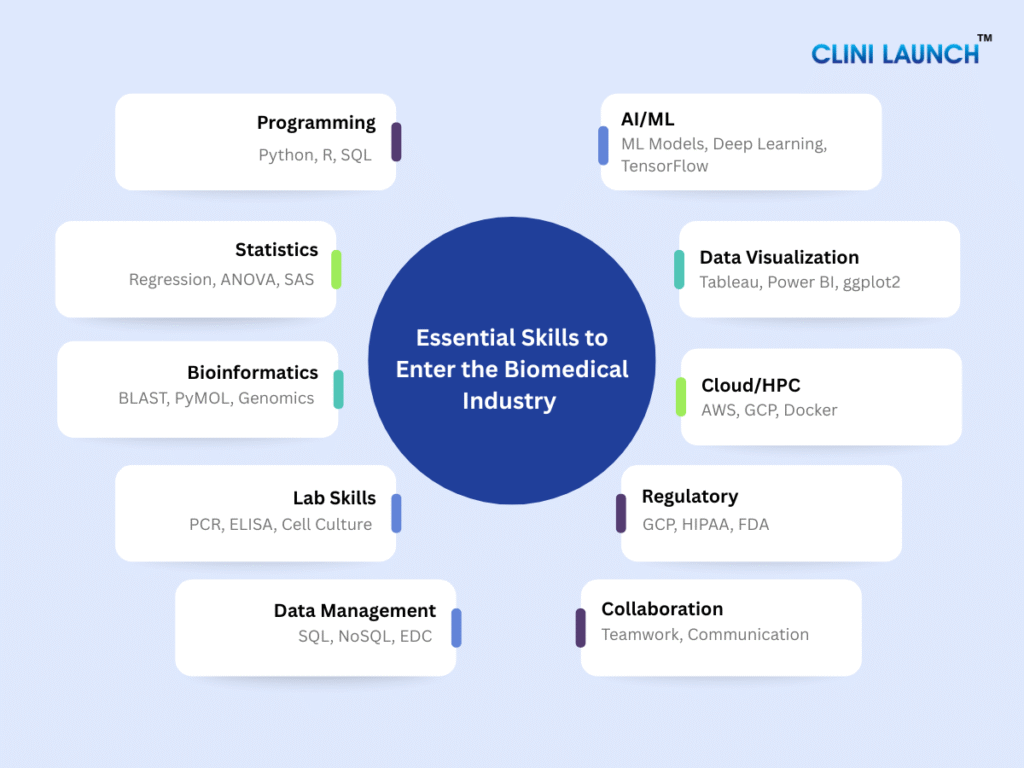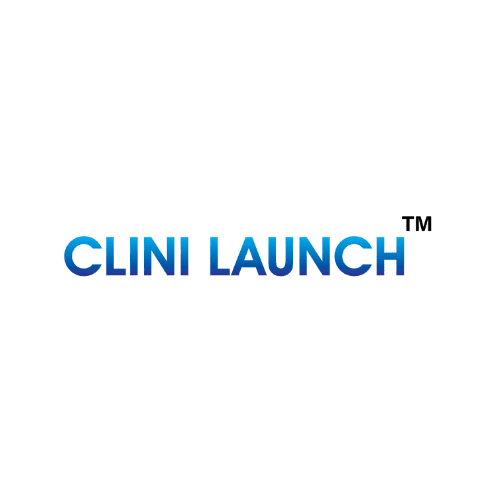The biomedical industry is going through a major phase of transformation driven by the emergence of new diseases. Lab methods are evolving, and AI‑driven techniques are rapidly becoming core to the functioning of the biomedical industry. In fact, about 49% of pharmaceutical and biotechnology companies reported using AI and big‑data in their programmes. However, a UK report states that there is a projected shortfall of up to 133,000 skilled workers in the life sciences sector by 2030, which emphasizes the urgent need for a skilled workforce.
Adopting these new techniques not only drives innovation but also creates more jobs, new vacancies, and higher demand for professionals with updated skills. 67% of life-sciences and pharma leaders agree that reskilling and upskilling is essential to address workforce shortages and prepare for future challenges. Because of this, the need for the right mix of technical, analytical, and adaptive skills is climbing fast — and knowing one extra relevant skill can move you from being one among many to standing out.
Here’s a list of the most essential Biomedical Industry Skills you need to develop to enter and compete in the biomedical industry.
1. Programming & Scripting Skills
Programming and scripting skills involve writing code to automate tasks, analyze data, and build workflows. With the rise of digital labs and AI-driven biomedical tools, coding has become a core skill — recruiters now expect scientists to “know a script,” not just run a pipette. You can start by writing a simple script and gradually develop production-grade SQL/Python ETL workflows integrating EHR data. Projects like a GitHub repo or automated NGS data cleaning can be added to your resume to stand out.
The U.S. Food and Drug Administration (FDA) has actively accepted outputs from R and is facilitating the use of both R and Python through technical guidance and pilot programs for regulatory submissions, confirming the languages’ utility and driving their growing demand across clinical programming and biostatistics roles.
Programming & Scripting Skills – Overview
| Skill | Programming & Scripting |
| What it Includes | Python, R, MATLAB, SQL, Java, Perl |
| Roles Requiring This Skill | Bioinformatician, Data Analyst, Clinical Data Manager, Biostatistician, AI/ML Engineer, Biomedical Researcher |
| How to Adopt / Fast Track | Take online courses, build GitHub projects, automate small datasets, create pipelines for EHR/NGS data, participate in hackathons |
2. Statistical & Data Analysis Skills
This biomedical industry skills involves turning raw biomedical data into actionable insights, applying techniques like regression, ANOVA, survival analysis, and predictive modeling. It helps researchers and clinicians identify trends, test hypotheses, evaluate outcomes, and make evidence-based decisions that drive research, clinical trials, and healthcare strategies.
Each year, over 1.5 million scientific articles are published in biomedicine and life sciences, and the registry for clinical trials lists more than 550,000 studies, yet companies struggle to find enough skilled statisticians and programmers to analyze this data. A global report highlights a severe shortage of professionals with expertise in statistics, data mining, and bioinformatics in the biopharma industry, even as roles in data analysis and related fields are projected to grow by more than 11% over the next decade.
Statistical & Data Analysis Skills – Overview
| Skill | Statistical & Data Analysis |
| What it Includes | Hypothesis testing, regression, ANOVA, survival analysis; R, SAS, SPSS, Python, Excel |
| Roles Requiring This Skill | Biostatistician, Data Analyst, Clinical Data Manager, Epidemiologist, Bioinformatician |
| How to Adopt / Fast Track | Take online courses, analyze public datasets, complete mini-projects for modeling and visualization |
| Advanced Diploma in Biostatistics | Program Duration: 6 Months |
| Master statistical methods for healthcare research and innovation, learning how to analyze, model, and interpret healthcare data with precision. Through structured modules and guided analysis, gain hands-on experience in probability, sampling, hypothesis testing, correlation, and regression. 5000+ learners enrolled | Live Instructor-led | Skills you’ll build: Probability, Sampling Design, Descriptive Statistics, Inferential Statistics, Regression Analysis, Hypothesis Testing, Analysis of Variance, Data Interpretation, Clinical Trial Design, Healthcare Data Analytics |
3. Bioinformatics & Computational Biology
A biomedical company doesn’t just want a scientist who knows biology, they want someone who can code a workflow and decode a gene. Finding such dual-skilled professionals is rare, like a hidden gem. Bioinformatics & Computational Biology is one of top biomedical industry skills that reflects the ability to analyze and interpret biological data, using tools like BLAST, Bioconductor, PyMOL, Cytoscape, Python, and R.
Many LinkedIn job listings include this skill in the first section of the description. To stand out, candidates can work on small projects such as building simple visualization pipelines or creating a GitHub repository. This is one of the skills needed to work in biotechnology industry, that is considered a top priority.
| Many companies are ready to invest in training employees who can bridge science and technology – some companies have launched generative-AI programs for over 56,000 staff to enhance these capabilities. |
| Skill | Bioinformatics & Computational Biology |
| What it Includes | Sequence analysis, genome annotation, molecular modeling, network analysis; Tools: Python, R, BLAST, Bioconductor, PyMOL, Cytoscape |
| Roles Requiring This Skill | Bioinformatician, Computational Biologist, Genomic Analyst, Research Scientist |
| How to Adopt / Fast Track | Online courses, public datasets, visualization pipelines, GitHub projects, small automation workflows |
| Advanced Diploma in Bioinformatics | Program Duration: 6 Months |
| This program prepares you to work at the intersection of biology, data, and computation. Learn how to analyze genomic and proteomic data, model protein structures, predict drug targets, and support precision medicine using real-world pipelines and IBM-guided labs. 5000+ learners enrolled | Live Instructor-led | Skills you’ll build: Genomics and Proteomics, Computational Biology Applications, Structural Bioinformatics Modeling, Next-Generation Sequencing (NGS), Sequence analysis, genome annotation, molecular modeling, network analysis; Tools: Python, R, BLAST |
4. Laboratory & Experimental Skills
Lab and experimental skills are essential for generating reliable data in research and clinical studies, forming the foundation of any lab career. While AI and automation skills are increasingly important, one survey found 75% of life‑science labs plan to adopt AI within two years, yet 34% cite a lack of skilled personnel, these advanced skills can often be learned and applied gradually throughout your job journey, building on a strong core of laboratory expertise.
It is an entry-level biomedical industry skills that speaks of a person’s ability to conduct experiments and generate reliable, reproducible data using techniques like PCR, ELISA, cell culture, spectroscopy, and electrophoresis. It helps researchers test hypotheses, validate results, and support discoveries in biomedical research, clinical trials, and drug development. Mastery of core lab techniques forms the foundation for adopting advanced tools like automation and AI throughout a scientific career.
| Skill | Laboratory & Experimental Techniques |
| What it Includes | PCR, ELISA, cell culture, spectroscopy, electrophoresis, lab automation/robotics |
| Roles Requiring This Skill | Research Scientist, Lab Technician, Biomedical Scientist, Clinical Research Associate |
| How to Adopt / Fast Track | Lab internships, online lab simulation courses, hands-on projects, virtual lab tools, small-scale experiments |
5. Data Management & Database Skills
A single Phase III clinical trial now generates around 3.6 million data points, a massive increase compared to a decade ago. With this explosive growth in biological and patient data, the demand for skilled professionals who can manage, clean, and analyze life-sciences data is higher than ever. The surge in clinical trials and bioinformatics research means more data than ever needs reliable storage, querying, and integration, creating a large demand for professionals who can manage and structure this flow.
The skill involves organizing, storing, and querying large biomedical datasets, using tools like SQL, NoSQL, data‑warehousing, and EDC systems. Mastery of this skill enables researchers and analysts to retrieve patient or genomic data efficiently, build pipelines for analysis, ensure data integrity, and support downstream analytics and visualization that drive biomedical insights.
Data Management & Database Skills:
| Skill | Data Management & Database Skills |
| What it Includes | SQL, NoSQL, data warehousing, Electronic Data Capture (EDC) systems |
| Roles Requiring This Skill | Clinical Data Manager, Bioinformatician, Data Analyst, Research Scientist |
| How to Adopt / Fast Track | Take online database courses, practice with public biomedical datasets, use cloud databases for hands-on experience |
| Advanced Diploma in Bioinformatics and Metabolomics | Program Duration: 3 Months |
| This program trains you to work across bioinformatics, metabolomics, and modern analytical techniques. Learn how to interpret metabolomic profiles, identify biomarkers, analyze multi-omics datasets, and build pipelines for systems-level biological | Skills you’ll build: Metabolomics Data Analysis, Biomarker Discovery & Validation, Multi-omics Integration (Genomics + Metabolomics), LC-MS & GC-MS Data Interpretation, Pathway & Network Analysis, Statistical Analysis for Metabolomics |
| insights. 5000+ learners enrolled | Live Instructor-led | Tools: Python, R, BLAST,SQL,NoSQL |
6. Machine Learning & AI Skills
AI is rapidly transforming biomedical research, more than 75% of life-science labs expect to adopt AI within the next two years, yet 34% cite a lack of skilled personnel as a major barrier. This highlights both the high demand for AI/ML expertise and the talent gap that makes professionals with these skills extremely valuable.
The skill shows a person’s ability to design and deploy machine-learning and deep-learning models, including predictive modeling, NLP, and image analysis, using tools like TensorFlow, PyTorch, scikit-learn, and Keras. It enables scientists to transform massive biomedical datasets into actionable insights, accelerate drug discovery, stratify patients, and embed AI into clinical and laboratory workflows.

Machine Learning & AI Skills:
| Skill | Machine Learning & AI |
| What it Includes | Supervised & unsupervised learning, deep learning, NLP; Tools: TensorFlow, PyTorch, scikit-learn, Keras |
| Roles Requiring This Skill | AI/ML Engineer, Bioinformatician, Clinical Data Scientist, Research Scientist |
| How to Adopt / Fast Track | Online AI/ML courses, Kaggle competitions, build predictive models on biomedical datasets, implement small NLP or imaging projects, contribute to GitHub projects |
| Advanced Diploma in AI and ML in healthcare | Program Duration: 3 Months |
| Learn how artificial intelligence and machine learning are transforming diagnostics, drug discovery, clinical decision support, and healthcare data analysis. Gain hands-on experience with medical datasets, predictive modeling, and AI-driven healthcare tools. | Skills you’ll build: Machine Learning Fundamentals, Healthcare Data Analysis, Deep Learning for Medical Imaging, Predictive Modeling, AI Tools & Automation in Healthcare |
| 5000+ learners enrolled | Live Instructor-led | Tools: Python, TensorFlow, scikit-learn, Jupyter Notebook, Healthcare Datasets (EHR/Medical Imaging) |
7. Data Visualization & Reporting Skills
With biomedical data growing exponentially, clear visualization and reporting have become critical, in fact, about 58% of healthcare practitioners use interactive data visualizations for medical diagnosis and treatment. This shows how much more in‑demand professionals are who can turn complex datasets into understandable storyboards.
This skill involves presenting complex biomedical data visually using tools like Tableau, Power BI, Python (matplotlib, seaborn) and R (ggplot2). It enables scientists to identify patterns, monitor patient outcomes, track KPIs, and communicate insights effectively in research publications, clinical dashboards, and operational reports.
Data Visualization & Reporting Skills:
| Skill | Data Visualization & Reporting |
| What it Includes | Tableau, Power BI, Python (matplotlib, seaborn), R (ggplot2) |
| Roles Requiring This Skill | Data Analyst, Bioinformatician, Clinical Researcher, Research Scientist |
| How to Adopt / Fast Track | Online courses on Tableau/Power BI, Python/R visualization tutorials, practice with biomedical datasets, build dashboards, contribute to GitHub or portfolio projects |
8. Cloud & High-Performance Computing Skills
Cloud skills are now crucial because major cloud providers like Microsoft Azure offer GxP-compliant and FDA-aligned cloud services, allowing clinical-trial and biomedical companies to securely run regulated workloads in the cloud. As more companies adopt these platforms, the need for professionals who understand cloud infrastructure and compliance has surged.
This Biomedical job skills involve using platforms like GCP, AWS, Azure, working with HPC clusters, and tools like Docker and Linux to handle vast biomedical datasets. Applications include large‑scale sequencing pipelines, AI/ML model training on biomedical data, and secure, compliant storage and analysis for sensitive clinical datasets.
| Skill | Cloud & High-Performance Computing Skills |
| What it Includes | GCP, AWS, Azure, HPC clusters, Docker, Linux |
| Roles Requiring This Skill | Bioinformatician, AI/ML Engineer, Data Scientist, Computational Biologist |
| How to Adopt / Fast Track | Take online cloud/HPC courses, practice on public biomedical datasets, build small-scale pipelines, use Docker and Linux for workflow automation, contribute to GitHub projects |
| Advanced Diploma in Clinical Research,Cybersecurity and Cloud Technologies | Program Duration: 6 Months |
| Become job-ready in Clinical Research, Cybersecurity, and Cloud Technology with hands-on training in clinical data, security compliance, and cloud-based systems used across modern clinical trials. NSDC and Brit Qualis accredited. 8000+ learners enrolled | Live Instructor-led | Skills you’ll build: Clinical Research Operations, Cybersecurity Fundamentals, Cloud Computing Essentials, Data Protection & Privacy (HIPAA/GDPR), Clinical Data Management |
9. Regulatory & Compliance Knowledge
Regulatory and compliance expertise is critical in the biomedical industry, where failing to meet standards can delay trials, clinical trial delays, rejection of trial data, or even complete denial of FDA approval. An industry insight notes that most of the life‑sciences employers see a lack of workforce skills as the top barrier (including regulatory and compliance knowledge) and only 27% are confident in their regulatory knowledge, highlighting the high demand for skilled professionals.
This skill involves understanding and applying guidelines and regulations such as GCP, HIPAA, FDA/EMA/CDSCO standards, SOPs, and data privacy protocols. It ensures that research and clinical activities are conducted ethically, safely, and in compliance with legal requirements, protecting patients, data integrity, and organizational credibility.
| Skill | Regulatory & Compliance Knowledge |
| What it Includes | GCP, HIPAA, FDA/EMA/CDSCO guidelines, SOPs, data privacy |
| Roles Requiring This Skill | Clinical Research Associate, Regulatory Affairs Associate, QA/QC Specialist |
| How to Adopt / Fast Track | Online regulatory courses, workshops, certifications (e.g., GCP, RAPS), stay updated with regional guidelines, practical experience in clinical trials or pharma compliance |
| Advanced Diploma in Clinical Research | Program Duration: 6 Months |
| Become a job-ready Clinical Research Associate in 6 months with hands-on trial management, monitoring practice, and industry tools. NSDC and Brit Qualis accredited. 8000+ learners enrolled | Live Instructor-led | Skills you’ll build: Regulatory Compliance, Research Methodology, Regulatory Affairs, Data Management Tools, Clinical Trial Management, Pharmacovigilance, Clinical Data Analysis, Medical Writing, Healthcare Industry Knowledge, |
10. Cross-functional Collaboration & Communication
Collaboration and communication skills are increasingly critical in biomedical research, where projects involve interdisciplinary teams of biologists, clinicians, statisticians, engineers, and business professionals. A 2025 report found that 45% of life‑sciences professionals identified fragmented communication as a major challenge for product launches and cross-functional alignment, emphasizing the need for skilled communicators.
This skill involves working effectively with cross-functional teams and clearly communicating scientific findings, whether through presentations, reports, or scientific writing. It enables professionals to translate complex science into actionable results, ensure smooth project execution, and foster innovation in research, clinical trials, and biotech product development.
| Skill | Cross-functional Collaboration & Communication |
| What it Includes | Working with biologists, clinicians, statisticians, engineers, business teams; Scientific writing and presentations |
| Roles Requiring This Skill | Project Scientist, Research Scientist, Clinical Research Manager, Product Development Specialist |
| How to Adopt / Fast Track | Develop teamwork and leadership skills through group projects, attend workshops on communication, practice presenting research to non-technical audiences, participate in cross-disciplinary research teams |
Future-Proof Your Career in Biomedical Sciences
In conclusion, the biomedical and life-sciences industries are undergoing rapid transformation, fueled by advancements in AI, big data, and evolving lab techniques. However, the talent gap remains a significant challenge: a recent industry review found that about 35% of roles in Pharma & Life Sciences remain unfilled due to talent shortages. Similarly, 67% of life-sciences organizations agree that reskilling and upskilling are crucial to meeting the future demand for skilled professionals in these rapidly evolving fields.
As the demand for professionals with a mix of technical, computational, and regulatory skills continues to climb, it’s clear that acquiring new skills and upskilling existing knowledge is no longer optional. To ensure you stand out in this competitive landscape, it’s essential to invest in comprehensive training that bridges this gap.
At CliniLaunch, our courses are designed to equip you with all the skills required for biomedical careers, from computational and cloud skills to regulatory compliance and programming, culminating in a capstone project that enhances your resume and builds a strong portfolio. By completing these specialized courses, you’ll improve your chances of getting hired, making you far more competitive than those without these critical, in‑demand skills.





